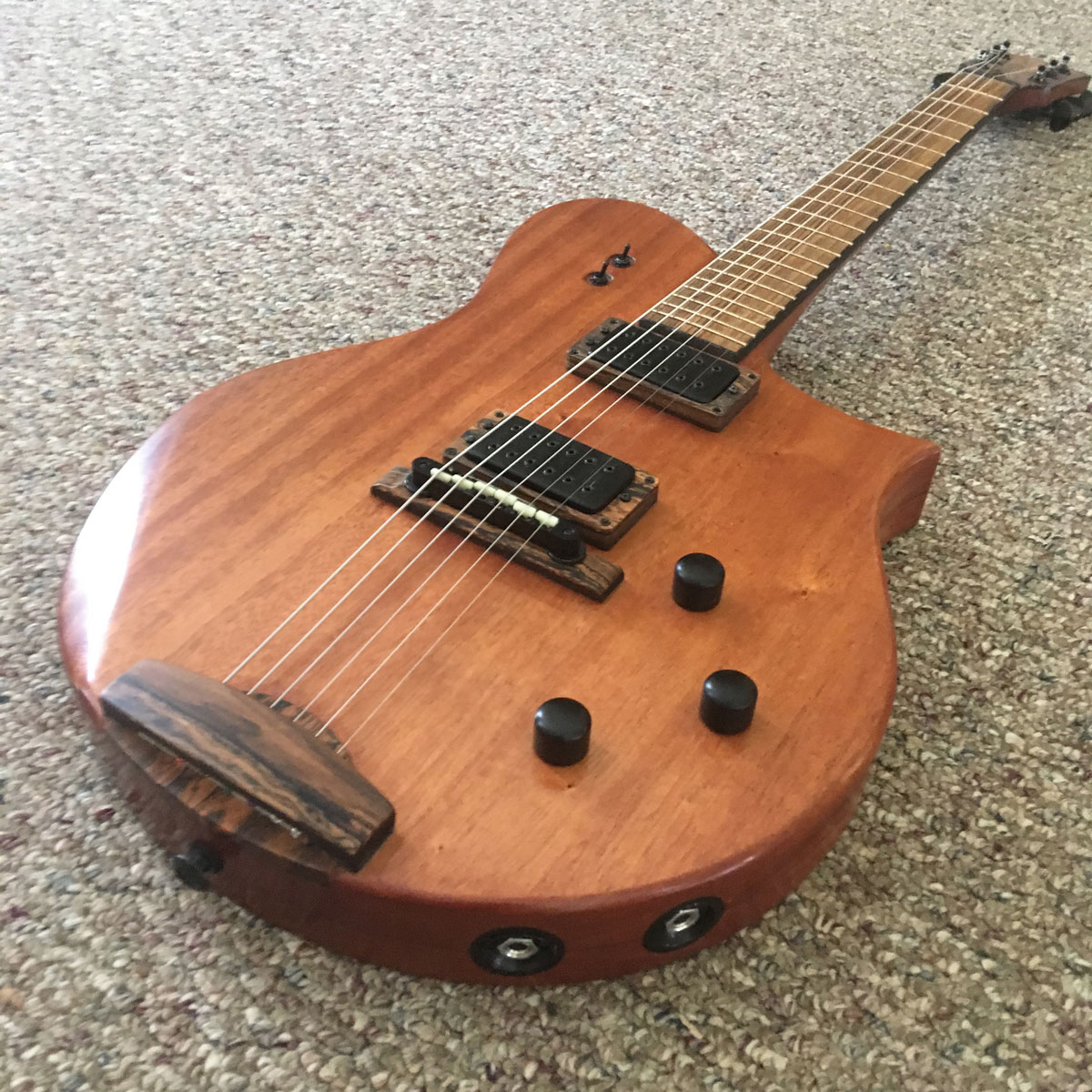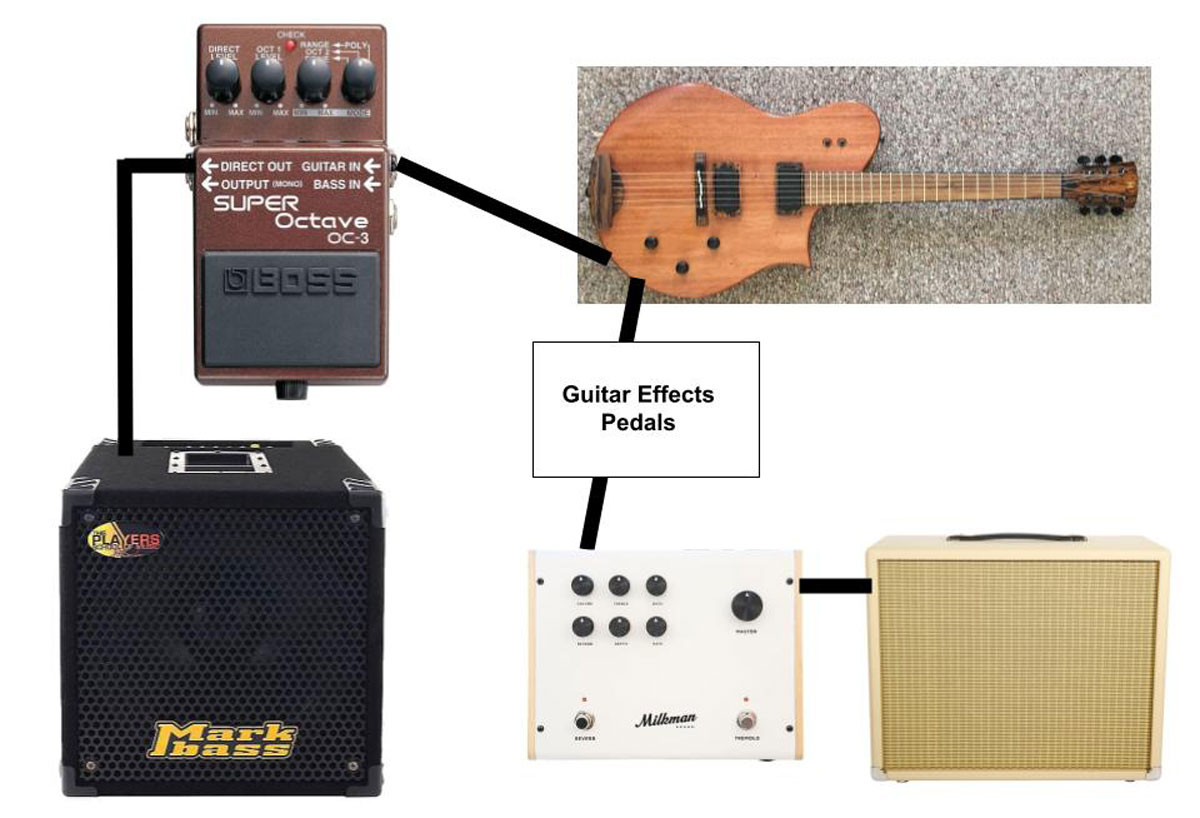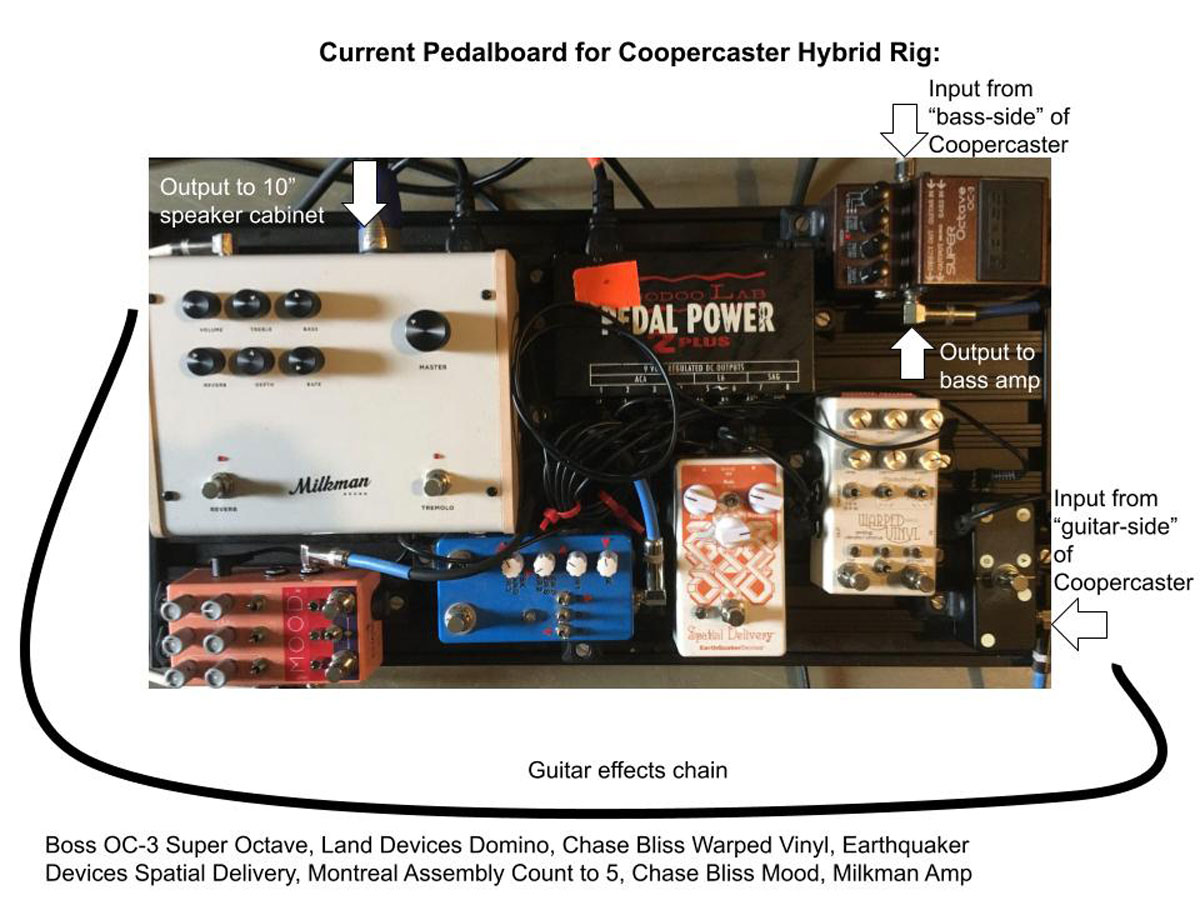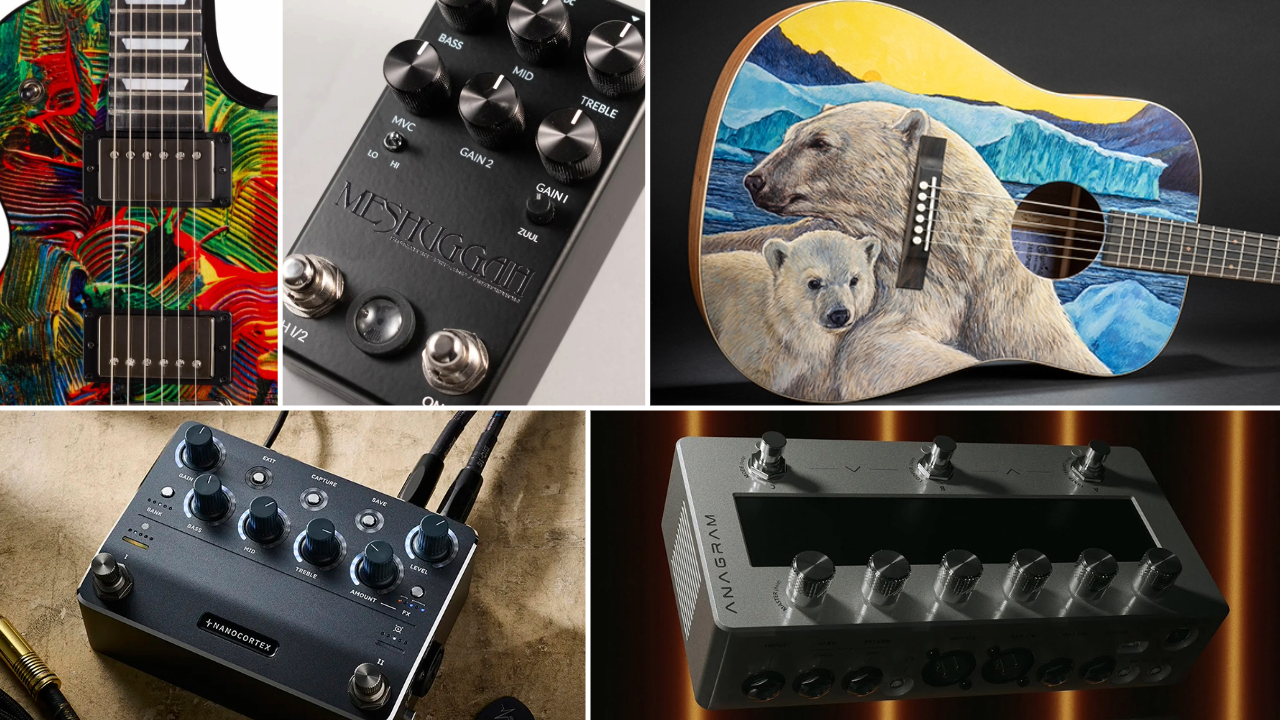King Garbage's Zach Cooper details his tricked-out Coopercaster hybrid guitar setup: “The potential for the hybrid rig is such a deep well”
The alt-soul guitarist talks building an instrument that organically covers the frequency spectrum, and the Mike Patton-backed band's carefully crafted sophomore album, Heavy Metal Greasy Love

Unique problems require unique solutions, and Zach Cooper is one hell of a problem solver.
The guitarist/multi-instrumentalist always had his work cut out for him when it came to recreating the complex sounds in his alternative-soul project King Garbage live, and that has only been compounded by the material on their new album for Mike Patton's Ipecac Recordings, Heavy Metal Greasy Love.
If you can imagine a melting pot of Daptone soul, jazz/funk fusion, dub reggae, experimental hip-hop and '70s classic rock, you may be getting somewhere in the ballpark of what King Garbage is doing on Heavy Metal Greasy Love.
It’s beautiful, broken, cold and bright, giving you glimpses of a bygone era while still being fresh and thriving in the present; it’s like wildflowers growing out of the cracks in a neglected city sidewalk.
It’s a simile that rings true for Cooper, too, and he beams at the notion when mentioned.
“That's definitely us, for sure. I'm from New York City, Vic's from Jersey, Pennsylvania and we both lived in New York City for a long time. We've seen our fair share of urban decay, and I would say that King Garbage actually kind of grew out of urban decay,” he says.
Urban decay aside, Heavy Metal Greasy Love is also a bustling mix of jazz club string quartets, clanging pianos, off-kilter percussive stabs and delicate fingerpicked guitar runs that play off swing rhythms and bursts of tarnished brass. There’s a lot going on here, but more importantly, it sounds amazing and is a lot more fun than any of those rudimentary descriptors would have you believe.
Get The Pick Newsletter
All the latest guitar news, interviews, lessons, reviews, deals and more, direct to your inbox!
“The feeling of the recording, how it makes you feel – that's the most important thing to us. And I think that's the kind of music that I resonate the most with. Am I getting feelings from this? Am I jamming? Am I rocking out?” Cooper explains.
“I’m not gonna talk shit on anyone, but there are bands and artists like this out there where you listen and all you can think about is how technically accomplished these people are. And to me, that's extremely boring and not helpful. By that, I mean they don’t offer anything in terms of emotional service.
“Really, the reason that you feel the way you feel when you listen to [King Garbage] is because we've been working together for so long. And we know each other: we speak each other's language musically, and everything is intuitive.”
The records that I like are the ones that are more like sculptures. I like a record that's carefully crafted
As intuitive as everything is, creating music in King Garbage is anything but immediate. From the tremolo-picked Spanish guitar that takes an almost ambient role in the epic Never Die, or the multi-tracked reverb-laden vibraphone parts that create the controlled cacophonous chaos on I Miss Mistakes, everything you hear is the result of extensive consideration and re-working.
“It all took so much time,” Cooper says.
“If it inspires anyone to be more thoughtful in their day to day, then that’s amazing, because all the tiny little things that are wherever they are in this record, none of it happened fast. This all happened over the course of years. Same with the last record – everything is very deliberate with us.
“People who make a record in the studio, and they spend $1,200 a day for studio time – that's crazy to me. Like y'all really think you can make a fucking masterpiece in like a month of everybody's hired block? Not to talk smack, but records like that very rarely blow my mind. The records that I like are the ones that are more like sculptures. I like a record that's carefully crafted.”

King Garbage are a duo made up of Cooper, and fellow multi-instrumentalist/percussionist/vocalist Vic Dimotsis. Since meeting at college in Burlington 16 years ago, they have worked on a range of different projects together, from their starting point as a “Latin-influenced grindcore band” to co-writing and co-producing material for the likes of The Weeknd, SZA and Leon Bridges, the latter of which earned them a Grammy nomination.
As accomplished as they are, though, they are just two people, and have tried to operate within that framework as much as possible, using only a handful of outside specialist musicians. Most of the instruments you hear on Heavy Metal Greasy Love were tracked by the pair in their home studios.
For the longest time, they performed live as a trio augmented only by saxophonist Jason Moore, and while this barebones approach allows for an unmistakeable fluidity, it created a problem for Cooper when it came to filling out King Garbage’s frequencies.
Cue the hybrid guitar.
Having bass and guitar strings on the same instrument can yield amazing sonic results
Spurned on by what he jokingly refers to as “a fear of bassists”, Cooper first started experimenting with split-signal playing – where he modified his style to cover both the bass and guitar parts – in 2017. From a technical standpoint, this was fairly straightforward to achieve with the use of a Boss OC-3 Super Octave, sending the wet effect signal out to a bass amp and the dry signal out to a guitar amp.
Inspired by the work of jazz maestro and noted champion of hybrid guitar Charlie Hunter, Cooper started to hunker down and develop a style that more effectively and organically covered the frequency spectrum.
Taking it to the logical next step, he worked with close friend, gifted luthier and now King Garbage live member Mike Holstein to create his very own hybrid guitar, the Holstein Coopercaster – a mahogany-and-walnut chambered semi-hollow body.

“Mike designed the ideal routing for my unique needs and skill set,” Cooper says. “Just looking at it, and playing it in standard mode, it’s just a badass electric guitar. Flick the switch and… boom, hybrid mode.
“The two lowest poles of the neck pickup hit a diode and route to a second output. That second output, or ‘bass side,’ chain is a Boss OC-3 to a Markbass amp. The ‘guitar side’ then hits a few pedals and a Milkman Sound amp, to a 10” cabinet also built by Mike Holstein.”


Being able to give the bass/root notes and the higher-end parts their own chain and specific treatment has enabled Cooper to more accurately recreate the luscious sounds King Garbage have crafted in the studio, but it’s the creative potential of the instrument that has him excited.
On the new album, the main track to feature the Coopercaster hybrid guitar is the single Busy On a Saturday Night, but the role of the hybrid guitar is almost certainly going to play a much bigger role in the creative process for Cooper – and he hopes many other guitarists – going forward.
“It's really been a utility for me to be able to be covering [both] the bass and guitar as a rhythm section entity with Vic,” Cooper says. “That has been my primary usage of it, but I'm looking forward to when I can spend more time just playing guitar and just being a guitarist – the potential for the hybrid rig is such a deep well.
“Being able to slam some power chords in guitar and bass octaves simultaneously can be very handy. Likewise, keeping delay relegated to the high register while I maintain a bassline on the low strings is also handy. With a split-signal six-string, there are endless ways to maximize your range and utility that a hybrid guitar may not offer.
“And vice versa, having bass and guitar strings on the same instrument can yield amazing sonic results that only the future holds for new guitarists choosing to walk the narrow path into hybrid-style or split-signal-style guitar playing.”
- Heavy Metal Greasy Love is out April 1 via Ipecac Recordings.
Chris is a contributor to Guitar World and MusicRadar with around 20 years of guitar playing experience – including writing for and recording various projects for around 15 of those. Outside of practical experience, he’s studied music throughout his life, with a particular focus on composition at university. He’s something of a 90s tragic and a sucker for anything with a groovy, metallic edge or psych and stoner vibes. Outside of music, he’s an avid cook, gardener, and rugby league lover.
“For years, the only 12-string acoustics I got my hands on, the necks always pulled off after a bit. I earned a lot of money replacing them!” Why one of the UK’s most prolific luthiers is a bolt-on acoustic die-hard
“While the odd corner has clearly been cut, these are true Gibsons with all the individuality that this brand exhibits”: Gibson J-45 Special and Hummingbird Special review









![[from left] George Harrison with his Gretsch Country Gentleman, Norman Harris of Norman's Rare Guitars holds a gold-top Les Paul, John Fogerty with his legendary 1969 Rickenbacker](https://cdn.mos.cms.futurecdn.net/TuH3nuhn9etqjdn5sy4ntW.jpg)


